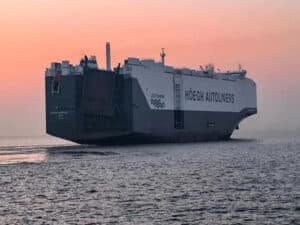
Onboard carbon capture project moves closer to pilot installation
Written by Nick Blenkey
ABS has given an AiP to a project that aims to trial onboard carbon capture on a Stena Bulk MR tanker. [Image: Tommy Chong (c) Stena Rederi]
ABS has given its Approval in Principle to a project that plans to demonstrate the feasibility of using carbon capture onboard a vessel, with a pilot installation on a Stena Bulk MR tanker.
Called Project REMARCCABLE (Realizing Maritime Carbon Capture to demonstrate the Ability to Lower Emissions), it involves a seven-member consortium whose members are the Global Center for Maritime Decarbonization (GCMD) in Singapore, the Oil and Gas Climate Initiative (OGCI), ABS, Stena Bulk, Alfa Laval, the Netherlands Organization for Applied Scientific Research (TNO) and Deltamarin Ltd.
The project is one of the largest of its kind. The AiP means the consortium can now look to move to the next stage of the project, which includes engineering, procurement and construction.
The consortium members believe the onboard carbon capture system could help accelerate commercial deployment of the technology within the next five years.
The two-year, three-phase demonstration project is investigating onboard capture and storage and offloading captured carbon dioxide to address the operational challenges and opportunities of deploying carbon capture technology on ships.
Following a full engineering study, the carbon capture system will be built and tested prior to integration onboard a Stena Bulk medium range (MR) tanker for sea trials. A rigorous stage gate review process will be conducted prior to progression between stages.
The consortium began the first phase of the project in 2022, which involved conceptual design and a front-end engineering design study of the carbon capture system.
The second phase includes engineering, procurement, and construction of a prototype shipboard carbon capture system and onshore commissioning. Phase three focuses on integrating the carbon capture system with the MR tanker and conducting sea trials.
The GCMD plans to launch a study on offloading the liquid carbon dioxide (CO2) to resolve potential challenges and inform the third phase of the project.
Michael Traver, head of OGCI’s Transport workstream, said: “The ABS’s approval in principle is a significant step forward for an important initiative to reduce emissions from shipping and demonstrates the value of collaborating across industries to develop decarbonisation solutions. As we move towards deployment, OGCI will continue to provide expertise on carbon capture to help our partners show the potential of the technology to meet ambitious decarbonisation goals set by the maritime industry.”
“Receiving the AIP from ABS for Project REMARCCABLE is a critical step in the further development of onboard carbon capture technology,” said Sameer Kalra, president of the marine division at Alfa Laval. “Our support goes beyond providing technological and engineering expertise in this field; we will provide access to the Alfa Laval Test & Training Center to test the carbon capture installation and impart training to the crew before its deployment on a vessel. Decarbonization demands the development of a wide range of emission-reducing technologies and we want to facilitate their development by collaborating with the maritime industry and helping reduce vessels’ carbon footprint.”
“This marks a significant project milestone and paves the way for the eventual shipboard installation of a scrubber and trialing it at sea,” said Professor Lynn Loo, CEO of GCMD. He added that, this past December, GCMD had issued an invitation for proposals (IFP) to evaluate the safety, technical and operational requirements for offloading shipboard captured CO2 during port calls. The awardee will be announced second quarter 2023; the findings of this study will further enable the operationalization of shipboard carbon capture sea trials.
“It is fantastic be able to receive this AIP from ABS and move forward towards installing a CCUS system on one of our Medium Range tankers,” said Erik Hånell, CEO of Stena Bulk. “Advancing carbon capture is one of the central ways that shipping will be able to meet its decarbonisation goals. It is a privilege to bring our technical and shipping expertise to the table as the consortium works together to scale the technology. Installing a CCUS system on one of our vessels demonstrates our long-term commitment to technological innovation and sustainability. We intend to use the system beyond the scope of this pilot project, proving to the market what is already possible through collaboration.”
Panos Koutsourakis, ABS vice president, global sustainability, said: “This is a milestone for onboard carbon capture technology, with significant potential to accelerate the pace of commercial applications. Carbon Capture will have a critical role to play in the decarbonization of shipping and we look forward to continuing our support, sharing our extensive technical guidance as we enter the prototype phase of this important project.”
Mia Elg, R&D manager at Deltamarin, said: “Deltamarin is proud to be integrating this new technology into the pilot vessel. The AIP is an important milestone that we can celebrate with the team! We are very pleased with the great collaboration we have had during the project so far, which is essential both for ensuring good performance of the system onboard and for the entire design and retrofit process.“




